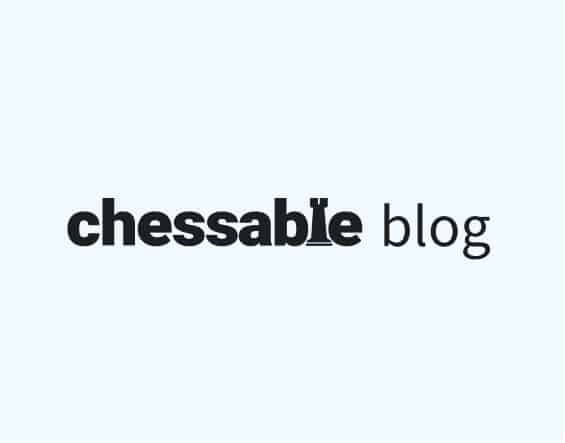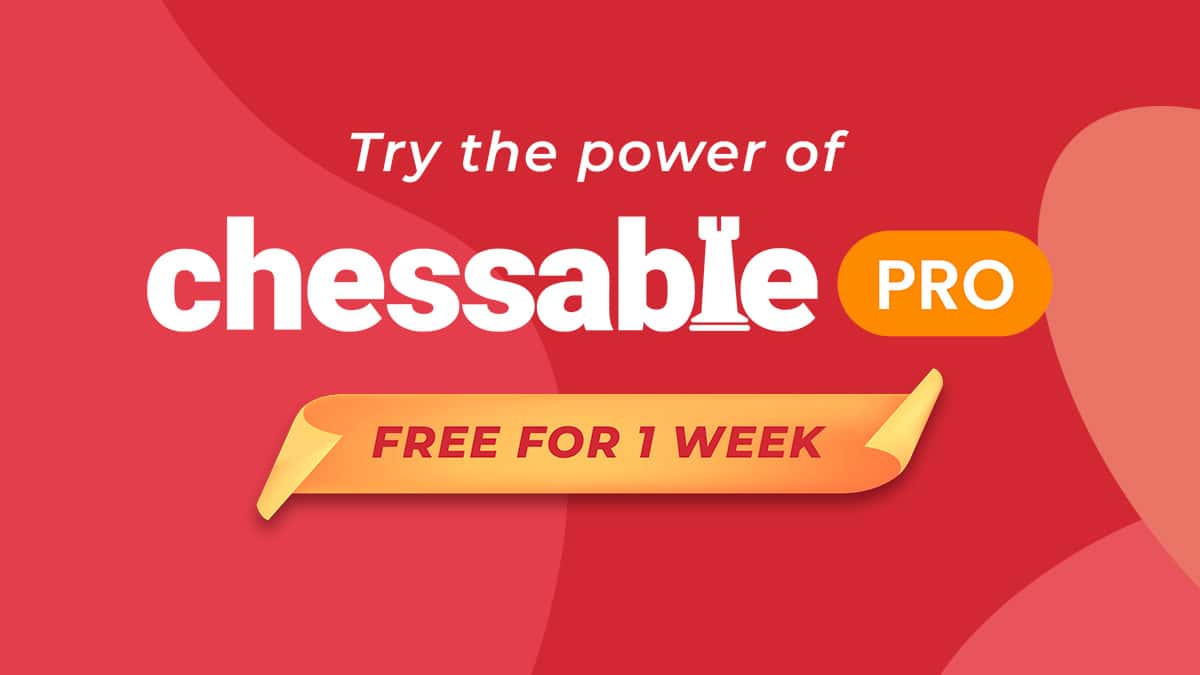Here we are with your weekend reading once again and this time we present an interview with FIDE Master Kamil Plichta.

Kamil, from Poland, is one of Chessable’s most popular authors. His range of Chessable courses on chess openings includes several which have attracted a cult following, including the Trompowsky and the Budapest Gambit.
We have already featured Kamil in our series on Chessable Authors in Action and today we find out more more about the man himself.
During the course of our interview we will discover many things, including how Kamil discovered chess, the story behind his working relationship with Chessable, the true (?) story of how he lost his hair and the potential reason he may eventually be fired from Chessable.
Discovering Chess
How did your chess journey begin?
In 1999 we went on holiday with my family. One day of that holiday, there was a heavy rain, so we stayed indoors. No smartphones then (I know, tough to believe), so me and my Dad looked for some board games. Fortunately, in the place where we stayed, there was a chess set.
You can guess the rest! After that holiday, I looked at chess from time to time, but the biggest step forward was getting a “Lego Chess” program, which made me really love the game on my 11th birthday.
Since my 11th birthday, I knew that chess is for me! I attended my first chess tournament when I was 12. It was 7 September 2002.
Did you have any particular chess heroes or role models to inspire you in the early days?
Not really. At least not how people would describe heroes having in mind some famous players. My biggest heroes were people who attended local tournaments and were winning them. For me it was impossible. Like I was just a beginner who was scoring 1 or 1.5/7 in every tournament. And there are those guys who constantly score like 5.5+ – so it was “WOW, how can someone be that good? They are easily beating players who I always struggle with!”
So I always tried to look at what these guys do differently, and tried to implement that into my games. And I was very stubborn. I was attending every club meeting when players were playing friendly games against each other – once a week from 16:30 to 20:00. Firstly, getting severely punched by everybody, and then, gradually, I became a competitor to them.
Influential Chess Books
Which chess books did you find the most instructive or inspirational during your early days?
In those early days I had almost zero access to chess literature. One day, one of the top players from my region brought a few books with him to the chess tournament. Of course, he wanted to sell them because he didn’t need them any more. So I took my money and for equivalent of the current eight euros I bought two books.
One was some openings book by Robert Hubner (amazingly, I can’t even find that book in Google now, and I don’t have it to look for the title).
The second one was Play the Caro-Kann by Anatoly Karpov. That book was translated to Polish, but it was very tough for an absolute beginner.
But the Hubner book was a jackpot hit for me. I found out that after 1.e4 e5 2.Nf3 Nc6 3.Nc3 Nf6 4.Bc4…
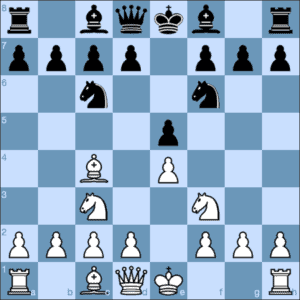
…Black has 4…Nxe4! with great chances.
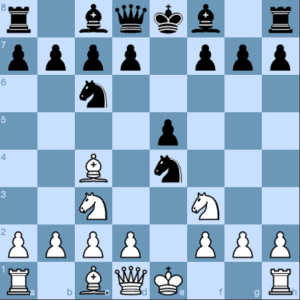
(The main point is that after 5 Nxe4, Black plays 5 …d5, winning back the temporally sacrificed piece and gaining the lion’s share of the centre.)
I was like damn, chess is so great I can do a trick like that! Then I learned what is the Sokolsky opening and others, then I started experimenting.
I guess that’s where my love for the opening phase of the game comes from.
Were any established players particularly helpful or kind when you broke through to upper levels of chess?
Hmm…everybody was always kind and nice, but I can’t name any particular player who helped me get where I am now. So I guess the answer is just NO.
Did you have a coach?
No, never. I started a little cooperation a few months ago and I like it so far.
Style and Influences
How would you describe your style of play?
A few years ago I would definitely say tactical and attacking. But from retrospect I can say that I didn’t win many attacking games in my career (lost a few though).
Nowadays, I would say that my style is dynamically positional with huge impact on imbalances and setting my opponent uncomfortable tasks (I named myself Kaldas90 only because NastyBasterd was already taken).
I love playing in a way that I can have an uncomfortable position, if it is also uncomfortable to my opponent. I love openings and psychology. Also, I think I am very good in exploiting my opponents’ time trouble.
My 2500-rated friend joked lately that if there would be a contest in Poland to select a player, who can be described by the word “unpleasant,” then I would win without any problems.
So I think that this has to be partially true, ha ha! Let’s name my style, then, as dynamically positional and unpleasant.
Were any other players influential in the development of your style?
It is tough to say. For sure there is a legendary Eduard Gufeld, whom I highly respect as a player (maybe less as a human).
My first serious chess opening book that I bought was Gufeld’s King’s Indian – the opening that I play since I bought the book. So for sure, Gufeld was the first player who influenced me (at least opening-wise).
It shouldn’t be surprising that I love games by Fischer or Geller, Stein, Bronstein – all of them played the King’s Indian. But I’ve never had any chess hero, at least I wasn’t like – damn, this guy has the style I would always have to have! I loved studying classics (and I still do) but I guess that all of those players influenced me a bit – some more some less.
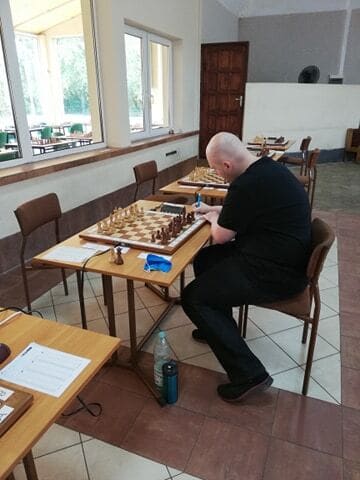
Kamil’s Memorable Games and Achievements
What is your most memorable success (so far!)?
In team competitions that would be winning the Polish Academic Championship in 2016.
In individual competitions, it is second place in the 2018 Polish Blitz Championship and third place in Polish Rapidplay Championship of 2019
For Classical chess, I have a few close to 2600 performances, but nothing special. I consider my biggest achievement to be the 2018 game against GM Dmitrios Mastrovasilis. I feel like I won that game in every possible aspect – preparation, psychology, tactics, strategy and time management.
The game featured a very rare (although high-scoring) piece sacrifice in the Panov and I managed to win my best game so far.
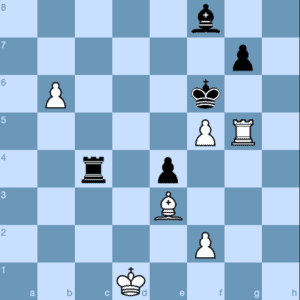
Kamil Plichta – Dimitrios Mastrovasilis
Polish Ekstraliga, 2018
White to play
(Kamil’s advantage carried through to the endgame and his passed b-pawn forced Black to part with material.)
48 b7 Rb4 49 Rg6+ Kxf5 50 Rb6 Rxb6 51 Bxb6 Bd6 52 Ba7 Kg4 53 Ke2 1-0
My biggest success online would be beating Hikaru Nakamura twice in a 3-Minute, six-game session.
This is something I already showed my friends (at least twice) and enemies (at least three times). So if you have seen this game more than twice – sorry.
It is an attractive game so let’s take another look at it here.
Kamil Plichta – Hikaru Nakamura
1 d4 g6 2 e4 Bg7 3 Nc3 c6 4 Bc4 b5 5 Bb3 a5 6 a4 b4 7 Nce2 Ba6 8 Nf3 d5 9 exd5 cxd5 10 O-O Nc6 11 Re1 e6 12 Nf4 Nge7
(Kamil now lights the blue touch paper…)
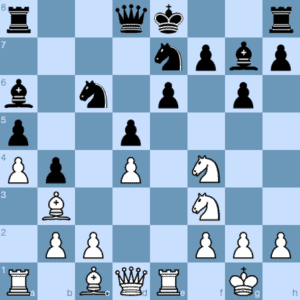
13 Rxe6! fxe6 14 Nxe6 Qd7 15 Nxg7+ Kf7 16 Bh6 Rhf8 17 Ng5+ Kg8 18 N7e6 Rf6 19 Nc5 Qd6
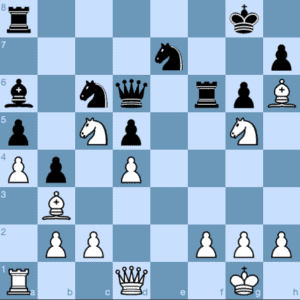
20 Nge4! (A fork made possible by a pin.) 20 …Qd8 21 Nxf6+ Kh8 22 Ne6
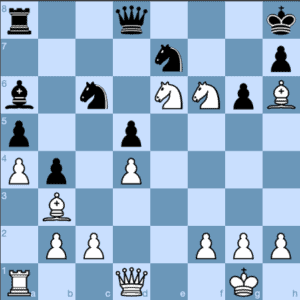
(An interesting final position! Facing the threats of both 23 Bg7 checkmate and 23 Nxd8 was too much for Black, who resigned, 1-0.)
Online Chess
Online elite chess events have been a major success over the Summer. Do you embrace the new era of digital chess or are you eager for real-life, over the board action to return?
I always loved online chess but I prefer over-the-board chess even more. There is more psychology, more nerves, more tension – basically more everything, only less miss-clicks. So I hope to see many more over-the-board tournaments, but I consider myself an online player as well!
Working with Chessable
How did you become involved with Chessable?
Back in 2016 I started working with my openings a lot and I always pondered the idea of doing opening courses in the future.
So when I heard about Chessable, I just wrote to David Kramaley with the ideas for the courses that I would have. David responded and we agreed for the Trompowsky course which was released a few months later! But if David wouldn’t reply or would say no, I would be texting him so much, that he would have to agree anyway – I think we both should be glad that David chose the wise path and agreed immediately!
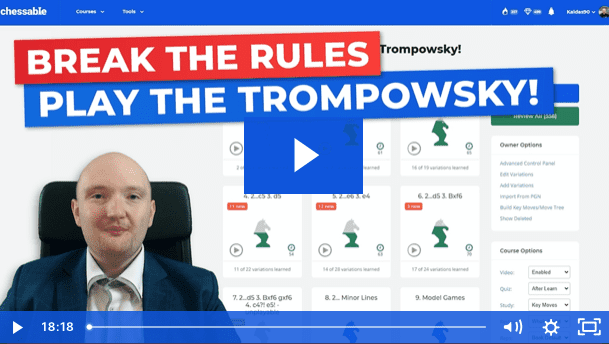
Tell us a little about your range of Chessable courses.
Wide I would say! I’m not going to lie and I will mention that I always considered myself to be specializing in some tricky sidelines that are also quite decent, like the Trompowsky and the King’s Indian Attack. Even the King’s Indian I play is mostly devoted to the …exd4 lines. So far I created the courses on:
1.d4 complimentary to the Trompowksy, so all lines besides 1…Nf6
Short & Sweet – The King’s Indian
As you can see, there are some positional openings here, but also some tactical ones. But there is one common feature of the aforementioned courses: dynamism, either tactical or strategic. Even if I work on openings that are supposed to be boring, I always try to extract maximum dynamic possibilities. My most common rule when doing the courses is to make boring things not boring. Whenever I see two continuations equal(ish) to each other, I prefer to go for the more aggressive ones. So my courses are usually quite dynamic and crazy at times.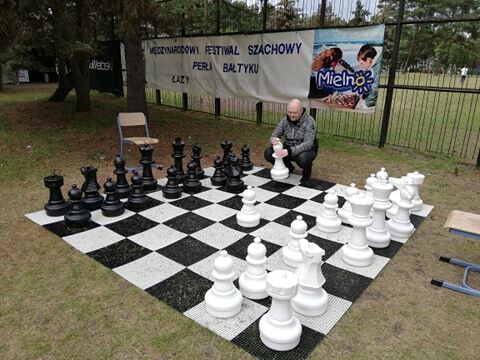
The Trompowsky Attack – larger than life, as usual
What else do you have in the Chessable pipeline?
There are some negotiations about my upcoming courses and we have some good ideas, but I won’t say too much because nothing is sure yet. I can say that my next work has a big chance of being co-authored with someone. Also, since Geert (Chief Content Officer and VP of Marketing for Chessable) is beating everybody with 1.b3 lately I should do an anti-1.b3 repertoire – even for free, just for glory. If I ever get fired, now you know the reason.
Work and Ambition
Do you still have the time and desire to work on your own game?
Of course! Even when I work on my Chessable courses, I use lines from ALL of my courses in my games. I have decent amount of time and I love the game! Chess is my passion and I will keep playing the game for my whole life! I still read a ton (during breaks from CS:GO and browsing memes) and I am actively using Chessable to master my openings.
What ambitions do you have as a player?
I started playing relatively late, playing my first tournament in 2002 and reached a rating of 1950 level in 2007 (although with current rating inflation I would say that it was an equivalent of 1750-1800 now).
Only when I was 19 I crossed 2100, 2200 when I was 23, 2300 when 24 and 2400 when 27.
Now I am 30 and I am at 2396 (mostly due to the fact that my k factor changed to 10 when crossing 2400 and the last tournament I played with k=20 I lost 65 ELO points…. So I had to grind like twice of them to get back to 2396).
My biggest ambition is to become a Grandmaster, but more importantly, I want to play like a Grandmaster. I don’t have this big push for the norms – I have two of them (International Master norms), and I feel like my level is already International Master strength so I think I will get there sooner or later.
But Grandmaster is going to be tough. My other goal is to get an individual gold in some kind of Polish Championship. If I don’t succeed in let’s say the next 10 years, I will try to play in something like Doctors Chess Championship, or Publishers Polish Chess Championship; I want that gold! I only hope I won’t be forced to play in Politicians Polish Chess Championship (God forbid) or Hairdressers Polish Chess Championship (I hope you know why).
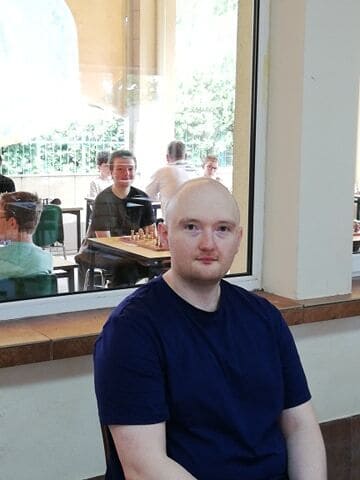
Kamil Plichta’s Advice for Club Players
Club players are always interested in ways to improve their game. What advice would you offer to them?
Don’t listen to people who say you can’t do something. That means they can’t; not you.
I heard many prophets who said I will never reach 1800 level, then 1900 and so on. Now, no way to get a Grandmaster title for me; too old, too weak or too stupid.
Just don’t care about them! People will usually pull you down for you to equal their level, not push themselves to the limit to improve their game.
Chess-wise, everybody is different so there is no golden rule. Find a GOOD coach would be my advice. I sometimes regret I didn’t do it, but I am also happy I achieved where I am by myself. But a GOOD coach can speed up your progress.
There is a ton of coaches now to choose from but be careful! A GOOD coach will usually create some training plan for you and follow it throughout the lessons. If your coach says that he does the same thing with every student – run!
If he says that he will teach you Caro-Kann and Queen’s Gambit Declined with Black and the London System with White, while you love games by Tal and Kasparov – run even faster.
It is coach’s job to adjust to your needs – not the opposite. Also, note how top level chess works. The better the players – a rating of 2700+ let’s assume – the bigger the impact on openings. I guess top players spend like 80% of their time on openings. And when you have a rating below let’s say 1800 FIDE, you need an opening repertoire, but not too complicated.
Trust me, only one game in like 20 might end because of some opening error, and usually, when you are good and resilient, you will come back.
So until you reach an Expert level or so, put only like 20-30% time MAX on openings and focus on solving tactics, studying classics, basic endgames – and that’s it.
I know it is a little hypocrisy, because what I did throughout my career is read books, play a ton (or two tons) of blitz and that’s it. I played a lot, read a lot and somehow improved (relatively a lot).
How do you cope with the pain of defeat?
After every game I lost I pulled one hair from my head. This is a way to become immortal – I can’t lose any more.
Do you have a favourite game of your own?
Yes; Plichta – Mastrovasilis, Polish Ekstraliga 2018 – which we already mentioned earlier.
How about a favourite game from history?
Carsten Hoi – Boris Gulko, I doubt many players know about this game but I hugely recommend it.
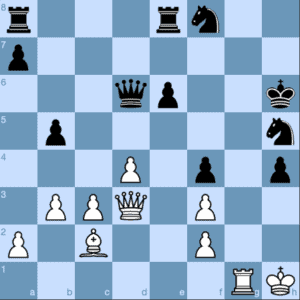 Carsten Hoi – Boris Gulko
Carsten Hoi – Boris Gulko
Thessaloniki Chess Olympiad, 1988
White to play
We advise readers to find the game and to play through it slowly, to better appreciate the tactical nuances. As a taster, we invite readers to checkmate Black in two moves from the position given above.
Satisfaction
Which aspect of chess life gives you the most satisfaction (writer, player, other…)?
I would say:
1. Author
2. Player
3. Coach
Nowadays, I don’t coach any more so I can focus on the first two.
Thank you very much, FIDE Master Kamil Plichta!
The other interviews in our popular series can be found here:


